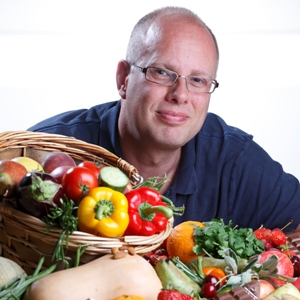TV series showcases scientist's efforts to get Britain's bees buzzing
Release Date 06 February 2012

A scientist at the University of Reading has called for immediate action to save pollinating insects crucial to British wildlife and the economy.
Simon Potts, Professor of Biodiversity and Ecosystem Services at the University's School of Agriculture, Policy and Development, said ‘strong conservation action' was needed now to reverse the decline in the UK's pollinating insects.
The plea comes as the first episode of a new TV series, Bees, Butterflies and Blooms, is due to be broadcast on BBC Two at 8pm on Wednesday (8 February 2012).
Professor Potts, an expert in the impact of pollinators on ecosystems, took part in the series, which is presented by gardening writer and broadcaster Sarah Raven and aims to spur viewers to help save the under-threat insects.
"Wild pollinators, such as bumblebees and hoverflies, are responsible for most of the pollination of wild flowers and crops in the UK, and it is these insects, not honeybees, who are the unsung heroes working hard for us," Professor Potts said.
"The value of pollination services to agriculture in the UK is about £440 million per year, with the most valuable contributions made by wild bees rather than managed honeybees.
"Our British pollinators are under severe pressure from habitat loss, agricultural intensification, diseases and climate change and strong conservation action is needed if we are to keep these essential elements of biodiversity."
The benefits from pollination are wide ranging, Professor Potts said. We are not only dependent for much of our food from pollinated crops, such as fruits and vegetables, but the wild flowers which paint our countryside in wonderful colours need pollinating to survive. In addition, many native birds and mammals, including rare species, rely on the seeds and fruits from insect-pollinated plants as a food source.
He added that towns, cities, and rural areas all benefit from the presence of bees and butterflies thanks to the flowers they pollinate.
As part of the BBC TV series Sarah Raven examines the impact of pollinating insects on the life of the countryside, towns and gardens, and big cities, and hopes to encourage individuals, businesses and authorities to do their bit to get Britain's bees buzzing again.
ENDS
For more details or to organise interviews, contact Pete Castle at the University of Reading on 0118 378 7391 or p.castle@reading.ac.uk.
The School of Agriculture, Policy and Development is a world leader in teaching and research in the natural and social sciences relating to agriculture, the food chain, rural environments and the countryside and international development. In the RAE 2008, 45% of its outputs were rated as either world leading or internationally excellent. Reading is the UK's top university for impact in Agricultural Sciences research (ISI Web of Knowledge, Essential Science Indicators).
The University of Reading is ranked in the top 1% of universities in the world (THE World University Rankings 2011-12) and is one of the top research-intensive universities in the UK.
